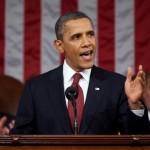
In a State of the Union address that was as much a campaign speech as a call to action, President Obama touted his administration’s success in spurring school reform and challenged lawmakers to build on this success by investing more in education and research to “prepare for the jobs of tomorrow.”
Facing a deeply divided Congress, Obama appealed for lawmakers to send him legislation on a host of issues, including education, clean energy, housing, and immigration reform—knowing full well the election-year prospects are bleak but aware that polls show the independent voters who lifted him to the presidency crave bipartisanship.
The president contrasted the selflessness and teamwork of the American troops who took out Osama Bin Laden with the gridlock that exists in Congress.
“Imagine what we could accomplish if we followed their example,” he told a packed chamber and tens of millions of Americans watching in prime time on Jan. 24. “Think about the America within our reach: A country that leads the world in educating its people. An America that attracts a new generation of high-tech manufacturing and high-paying jobs. … An economy built to last, where hard work pays off and responsibility is rewarded.”
Later, he said: “I intend to fight obstruction with action.” House Republicans greeted his words with stony silence.
Read the portions of Obama’s speech that deal with education here.
Attempts to rewrite the 10-year-old No Child Left Behind law are one example of how Congress has been unable to reach an agreement, despite widespread consensus on the need for reform. Several bills addressing NCLB have stalled in Congress.
Obama talked about the value of good teachers and called on policy makers to stop “bashing them.” He offered lawmakers a deal: More resources to help teachers succeed, in exchange for more flexibility to help schools “replace teachers who just aren’t helping kids learn.”
The president also suggested that states pass laws requiring students to stay in school until age 18 or when they graduate, and he called on colleges to end “skyrocketing” tuition costs. If they don’t, he suggested that federal funding to colleges may go down—though he didn’t offer specifics.
Obama said his administration has “put more boots on the border than ever before,” resulting in “fewer illegal crossings.” But he asked Congress to create a path to citizenship for children who come to the United States with their undocumented parents if they complete college.
“Let’s at least agree to stop expelling responsible young people who want to staff our labs, start new businesses, defend this country,” he said. “Send me a law that gives them the chance to earn their citizenship. I will sign it right away.”
Obama’s State of the Union address not only outlined his agenda for the coming year, but also highlighted his past accomplishments as he prepares to mount his reelection campaign. He touted his administration’s success in getting states to raise their standards just for the chance of earning additional funding through Race to the Top.
“For less than 1 percent of what our nation spends on education each year, we’ve convinced nearly every state in the country to raise their standards for teaching and learning—the first time that’s happened in a generation,” he said.
But innovation “also demands basic research,” he said. “Today, the discoveries taking place in our federally financed labs and universities could lead to new treatments that kill cancer cells but leave healthy ones untouched. … Don’t gut these investments in our budget. Don’t let other countries win the race for the future. Support the same kind of research and innovation that led to the computer chip and the internet; to new American jobs and new American industries.”
Read the portions of Obama’s speech that deal with education here.
American Federation of Teachers President Randi Weingarten issued the following statement in response to the president’s speech:
“President Obama made crystal clear tonight that the health of our economy and the quality of our public education system always have been and always will be intertwined. … [He] also made clear tonight what America’s teachers have long understood: We can’t test our way to a middle class; we must educate our way to a middle class. The overemphasis on testing has led to narrowing of the curriculum, rather than creating a path to critical thinking and problem solving. These are the kinds of knowledge and skills our children need to compete in the global economy.”
Weingarten added: “Respecting public school teachers and providing them with the tools and resources they need to help our children learn and grow are essential to building a strong public education system, competing in a global economy, and restoring economic opportunity for all.”
The Democratic president’s vision of an activist government broke sharply with Republican demands for less government intervention to allow free enterprise. The stark differences will be evident in the White House’s dealings with Congress and in the presidential campaign over the next 10 months.
In the Republican response to the president’s address, Indiana Gov. Mitch Daniels, who once considered a White House bid, railed against what he called the “extremism” of an administration that stifles economic growth.
“No feature of the Obama presidency has been sadder than its constant effort to divide us, to curry favor with some Americans by castigating others,” Daniels said, speaking from Indianapolis. “As in previous moments of national danger, we Americans are all in the same boat.”
- ‘Buyer’s remorse’ dogging Common Core rollout - October 30, 2014
- Calif. law targets social media monitoring of students - October 2, 2014
- Elementary world language instruction - September 25, 2014
